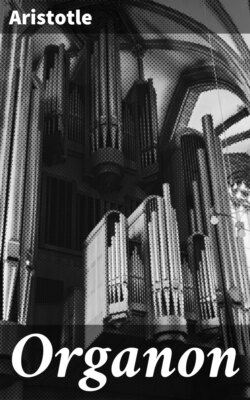Читать книгу Organon - Aristotle - Страница 9
На сайте Литреса книга снята с продажи.
Chapter 5
ОглавлениеTable of Contents
We must describe what definition, property, genus, and accident are. Now definition is a sentence signifying what a thing is: and either a sentence is employed instead of a noun, or a sentence instead of a sentence, since it is possible to define some things which are signified by a sentence. As many however as in some way or other make the explanation by a noun, evidently do not explain the definition of the thing, since every definition is a certain sentence. Still we must refer a thing of this kind to definition, as that the becoming is beautiful; in like manner also whether sense and science are the same or different, since about these definitions, whether they are the same or different, there is a very great discussion. In short, however, all things may be called definitive which are under the same method with definitions, but that all which have been spoken of are of this kind is evident from these (considerations). For when we are able to argue that a thing is the same and that it is different, we shall by the same manner be well supplied with arguments about definitions, since when we have shown that it is not the same we shall have upset the definition. Still what is now said is not converted, since it is not enough to construct a definition to show that it is the same, but for the subversion of definition it is sufficient to show that it is not the same thing.
Property, indeed, is that which does not show what a thing is, but is present to it alone, and reciprocates with the thing. As it is the properly of a man to be capable of grammar, for if he is a man he is capable of grammar, and if he is capable of grammar he is a man; since no one calls property that which may possibly be present with something else, as sleep to a man, not even if it should happen at a certain time to be present with him alone. If then any thing of this kind should be called property, it will not be called property simply, but at a certain time or with reference to something, since to be on the right hand is sometimes a property, but biped happens to be called property with reference to something, as to man with reference to horse and dog; but that nothing which may possibly be present with something else is reciprocally predicated is clear, since it is not necessary if any thing sleeps that it should be a man.
Genus, however, is that which is predicated of many things differing in species, in (answer to) what a thing is; but let those things be said to be predicated in (answer to) what a thing is, which are fitted to answer the person inquiring what the proposed thing is, as it is adapted to man, when it is asked what the proposed thing is, to say that he is animal. Moreover it is generic, whether one thing is in the same genus with another or in a different genus, since such a thing falls under the same method with genus, as having discussed that animal is the genus of man, and in like manner of ox, we shall reason that they are in the same genus; if, however, we should show that it is the genus of one of them, but not of the other, we shall reason that these are not in the same genus.
Accident, again, is that which is not any of these, neither definition, nor property, nor genus; yet it is present with a thing, and is that which may possibly be present with some one and the same thing and may not be present, as, to sit may be and may not be present with some one and the same thing, and in like manner whiteness, for there is nothing to prevent the same thing being at one time white and at another not white. Now of these definitions of accident, the second is the better; since when the first is stated, it is necessary in order to understand it, to know previously what definition genus and property are, but the second is self-sufficient for the knowledge per se of what the thing asserted is. To accident also let comparisons of things with each other belong, in whatever way they are derived from accident, as, whether the honourable or the advantageous be preferable, and whether a life of virtue or of enjoyment is the sweeter, and if there happens to be any other assertion similar to these, for in all things of this kind, the question arises as to which the predicate rather happens to belong. Still from these it is manifest that there is nothing to prevent accident sometimes, and with reference to something, becoming property, as to sit being accident, when some one alone sits, will then be a property, but one not sitting alone, it will be a property with reference to those who do not sit, so that nothing prevents accident from becoming property in a certain relation and at a certain time; simply, however, it will not be property.
